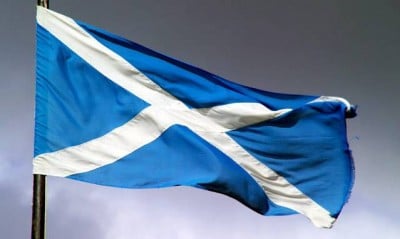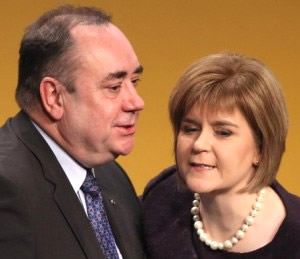Scotland Votes ‘NO’, Now Watch As the Ground Shifts Beneath Our Feet

Did that just happen?
The world was still up at 3am British time on Friday morning to catch the first returns from Scotland’s historic Independence Vote. Everyone wanted to know.
The Indy bug is a global one for sure, and there is no bigger trend right now than the trend toward autonomy. It will break down hundreds of redundant imperial borders and will be the source of endless strife as the world tries to let go of 19th and 20th century constructs. The world was definitely watching Scotland.
From a global perspective, it seemed like 100% of the world was pulling for a Scottish ‘YES’ even if just less than half of Scots were.
In the end the ‘NO’ campaign took the ‘YES’ by a 10 point margin (we are told), 55% to 45%.
 For the ‘NO’ crowd it was a real kitchen sink moment. They were backed by the political establishment in Westminster, the City of London and the mainstream media (led by the BBC). Expectedly, PM Cameron came out swinging, as did Tony Blair’s former sidekick and banker puppet, Gordon Brown, became the tip of the spear of the ‘NO’ campaign. Captains of industry, celebrities and every conceivable pundit you can image was wheeled out two weeks before the vote on every TV and radio program.
For the ‘NO’ crowd it was a real kitchen sink moment. They were backed by the political establishment in Westminster, the City of London and the mainstream media (led by the BBC). Expectedly, PM Cameron came out swinging, as did Tony Blair’s former sidekick and banker puppet, Gordon Brown, became the tip of the spear of the ‘NO’ campaign. Captains of industry, celebrities and every conceivable pundit you can image was wheeled out two weeks before the vote on every TV and radio program.
It was also hard not to notice the multi-million pound PR campaign behind it. They managed to rebrand the word ‘NO’, to “Better Together”. They laid out a full range of slogans from the polite “No Thanks”, to the quintessentially cautious, “Vote NO, it’s not worth the risk”.
The Queen tried to weigh-in, but didn’t really. All she could manage was her hope that, “an enduring love of Scotland” will unite Britons’. US President Barack Obama couldn’t resist either, welcoming the Scots’ decision to stay in the UK (and NATO).
The desperation on the part of London’s establishment was pretty visible, as fear-based scenarios were deployed in ways not seen before. Deterrents ranged from the reserved, “It’s probably not a good idea”, to a more abrasive, “Pensioners will lose their pots, and the country will be plunged into debt”, or “Banks, profits and jobs will flee south!”, and rounded off by outright scare mongering by British PM David Cameron who ranted that a ‘YES’ vote would attract a wave of violent Islamic terror north of Hadrian’s Wall.
Not surprisingly, there were numerous reports of election and voter fraud, which is par for the course in western democracies these days. Sadly, not much will come of these reports other than further denting public confidence in our famous ‘democratic values’ in the west.
The story is far from over. Aside from a potential British Constitutional meltdown, ‘Devo Max’, full fiscal autonomy for Scotland – is still very much alive and well, and might further fuel a Constitutional crisis for Great Britain. The experts are saying that it will create uncertainty for business, and the ripple effects could be very significant.
 SNP leader Alex Salmond and future leader Nicola Sturgeon.
SNP leader Alex Salmond and future leader Nicola Sturgeon.Meanwhile, the head of the Scottish National Party who drove the campaign for Independence, Alex Salmond, resigned from his leadership position of 20 years today. This was a dramatic move for sure, and one that will leave experts scratching their heads about what backroom deal has been done. Favoured to replace him is SNP Deputy First Minister Nicola Sturgeon.
Before the vote there, everyone was speculating about everything. The Telegraph’s Peter Oborne summarised a few of the empire’s lingering concerns:
“National partitions – think of Ireland in 1922, India in 1947, Southern Sudan more recently or the birth-pangs of a Kurdish state today – are always bitter affairs. This is because two sides are arguing over the spoils. Who owns what? To whom do the armed forces give allegiance? Who inherits the debt? Who keeps the currency? There is already evidence of sectarian hatred, both north and south (where there are signs of a malevolent new English identity) of the border.
All of these issues will have to be dealt with by a set of politicians reeling with shock at the collapse of many of the landmarks that have given meaning to their lives…”
Shares on the London stock market rose on today and The Pound is up. Happy days, right?
Now let’s look at a few of the winners and losers from Thursday’s vote…
Winners:
The Scottish People – The cat is already out of the bag. As far as national identities go, Scotland’s stock is up. As a concept of a nation state, it’s already pre-qualified, better in fact than any other aspiring nation state, and can field as strong a case as France even. Voter turnouts of 80-90% are unheard of in modern European times so something was awakened over this issue. This renewed sense of identity cannot be a negative thing for your average Scot. The Aye’s may have lost this round, but the idea will continue to endure.
David Cameron – Imagine going down in history as the Prime Minister who presided over the break-up of the UK. David Cameron avoided such a fate, and power has remained consolidated in London. There were strong hints that if Scotland went off the reservation then Wales would next to secede, but that didn’t happen this time around. Bankers are happy. Sorted Dave. On to the next crisis.
NATO – Keeping the UK together means there will be no interruption in Britain’s NATO status and aspirations of ruling the world through the UN security council. An Independent Scotland would have meant that Trident nuclear submarines might have been moved or a contingency plan implemented. Without nukes, Britain cannot rightly serve on the UN Security Council thus losing its seat at the round table of world power, and severely clipping its NATO wings, bringing it down to the level of Spain.

Catalonia – Among the teams of international election observers in Scotland this week were a team of Catalans. They watch and learned, and will no doubt be applying their knowledge back in Spain during the run-up to their own independence vote this November. Despite the NO result in Scotland, the whole exercise will only embolden the Catalans, as they prepare to lock horns with their masters in Madrid. Many of the same issues facing Scottish Independence – EU membership, currency, and commercial migration – are also front and centre for an independent Catalonia too. Do not underestimate the momentum behind the Catalonia independence movement – it’s massive, but so is the indifference in Madrid.
UKIP – Regardless of the final result, the UK Independence Party (UKIP) has been basking in the festivities, and observing with great interest the many cracks forming as a result of the Indy drive. Even if you think that the Scotland Indy campaign was an EU trojan horse, the overall public sentiment was about independence and all its trappings. Scotland’s desire to devolve has elevated UKIP’s agenda south of the border.
The Royals – To be sure, the biggest worry for the Windsors was the prospect of having the vacate their beloved Balmoral Castle in Scotland. Besides having to clear out all those party favours from the basement, it would have been a scheduling nightmare for the royal household and would have ended up costing the British taxpayer even more than they are already shelling out for their German royal family. The status quo has been preserved.
Losers:
Scotland’s Labour Party – The split within the Labour Party over the Indy vote was pronounced. Gordon Brown’s cheer leading section saw his performance as proof that he should be back in frontline politics, but numbers were an internal massacre for Labour – nearly half of Labour voted for Scottish Independence.
BBC – No demon reared its ugly head as much as the BBC in this drama. They may have succeeded in swinging the NO vote, but the BBC has managed to alienate and further disconnect itself from half of the Scottish population who are accusing it of extreme bias. The even came out to protest outside BBC headquarters. From the onset, the public was treated to yet another reason to withhold their license fee, as the BBC took a clear side in the debate – defending the City of London and Westminster’s desires for Scotland to stay in the United Kingdom by blatantly shilling for the ‘NO’ campaign. It was embarrassing to watch, but it showed that even during the most pivotal moments facing society – the BBC plays the role of propaganda arm for the establishment, effectively working against the people.
EU – Brussels has a big problem now: monkey see, monkey do. As we mentioned before, even if you think the Scotland ‘YES’ drive was an EU/Eurozone trojan horse, Scotland’s exercise in people power has sent shock waves through the European Union’s bureaucratic gravy train. The whole concept of the referendum is something that Brussels technocrats would prefer be left in the theoretical realm, and not something that people can actually do. If the EU actually allowed its members to engage in real democratic activities (like holding referendums), it would lead to a shrinking of the Union and Eurozone.
Scotland is settled for now, but what Britain is left with is its biggest Constitutional crisis in 300 years. There is a lot happening in, and out of Westminster and unfortunately most of it is happening completely outside of the democratic process. Even though it came down as a NO vote, David Cameron is still talking about a”settlement for Scotland” and other “settlements”, but what he’s really talking about is restructuring government as we know.
Pundits have listed a number of possible scenarios we could have expect from either a ‘YES’ or a ‘NO’ result in Scotland, and either way you cut it, almost every turn will eventually result in a full-blown constitutional crisis. The future of the EU has no room for nation states or national Constitutions. Nation states will be replaced by regions and feudal city states and these will require a hardened fascist framework to hold it together. Is this the “settlement that David Cameron is referring to? It’s all in the EU’s own forward planning documents.
The ground is shifting beneath our feet and a surprisingly few are taking any notice.
But you won’t read about that in The Times or hear it on the BBC…

